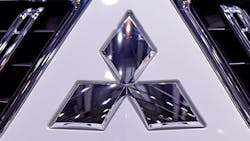Mitsubishi Motors Corp. said it manipulated mileage test data for its minicars sold in Japan, resulting in 620,000 vehicles produced in the past three years being labeled more fuel efficient than they actually are.
The tests overstated fuel efficiency by 5% to 10%, and Mitsubishi Motors said it’s investigating who’s responsible. The company said the violation may result in the Japanese automaker having to pay back government tax rebates for the vehicles, of which 468,000 were supplied to Nissan Motor Co.
Mitsubishi Motors’ shares fell 15% for the biggest decline in more than a decade in Tokyo trading, cutting its market value to 721 billion yen ($6.59 billion). The company’s manipulation of tests will further intensify scrutiny of the auto industry after Volkswagen AG’s admission last year that it had rigged diesel models with software to meet U.S. emissions standards.
“This may be different from Volkswagen’s issue, but the market has become very sensitive to such kind of news,” said Seiji Sugiura, an analyst at Tokai Tokyo Research Center. “It may have a similar impact in terms of sales and the company’s reputation.”
The company said it tested the vehicles using tire and air resistance that yielded better fuel economy than the actual rates. The mishandling of the test data was “intentional,” said President Tetsuro Aikawa, who bowed in apology before a briefing in Tokyo on Wednesday.
Mitsubishi Motors is also checking whether the cheating affected overseas models and said it was unable to estimate the impact of the manipulation on its business at this point. Separately, the company said it has used a method to test mileage since 2002 that is not compliant with Japanese standards.
Nissan, which sells the eK model as the Nissan DayZ in Japan, had discovered the discrepancy in mileage. The company has suspended sales of the DayZ and DayZ Roox models Wednesday until Mitsubishi Motors provided further clarification, Nissan spokesman Jonathan Adashek said.
Mitsubishi Motors’s disclosure may cause further damage to consumers’ trust in car companies’ fuel economy claims. Hyundai Motor Co. and Kia Motors Corp. agreed to pay fines and forfeit emissions credits in late 2014 to settle U.S. claims that they overstated mileage ratings. Ford lowered ratings for hybrid models in both 2014 and 2013.
The Japanese automaker has been seeking to restore confidence after a series of scandals more than a decade ago led the carmaker to seek multiple bailouts from Mitsubishi group companies. Mitsubishi Motors had covered up defects involving flawed axles that could lead wheels to detach.
“It’s again bad for the company’s image,” Sugiura said. “It’s not the first time for Mitsubishi to have this kind of issue, and this definitely won’t help them rebuild their reputation.”
Mitsubishi Motors’ domestic sales fell 18% last year to 102,010 units, the fourth consecutive annual decline.
By Ma Jie and Yuki Hagiwara
About the Author
Bloomberg
Licensed content from Bloomberg, copyright 2016.
